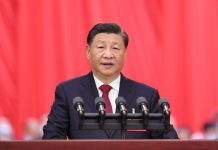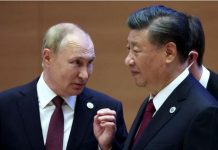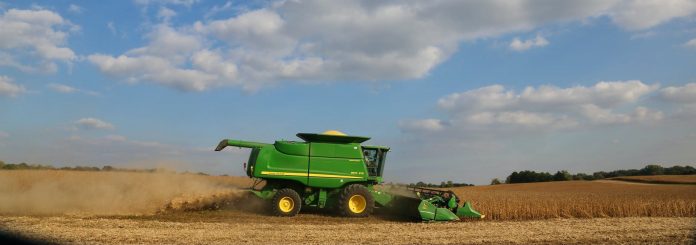In the latest concession to European farmers, the 27 EU member states have decided to impose stricter tariff rules on imported Ukrainian agricultural products.
European farmers, who protested in Brussels again this week, have expressed anger about unfair competition resulting from cheap imports – and have been protesting eloquently since Russia’s invasion of Ukraine led to a butterfly effect of imbalance in the agricultural economy rippling across the European continent.
On Wednesday, the 27 EU member states agreed on a new compromise on customs requirements for certain Ukrainian agricultural products, the Belgian presidency of the Council of the EU announced.
The compromise stipulates that fewer goods than originally planned will be allowed to be sold duty-free into the EU.
These include eggs, poultry, sugar and maize.
France and Poland had unsuccessfully sought to have wheat – Ukraine’s major source of export – included in the list of Ukrainian farm products subject to the caps.
Goods affected by the requirements will only be allowed to be imported into the EU duty free up to a certain amount. When this amount is reached, tariffs will apply again.
Instead of basing the duty-free caps for those goods on average volumes from 2022 and 2023, France had been asking for 2021 to be included in the range to work out averages. According to diplomatic sources, the reference period will now also include the second half of 2021, when fewer of the affected Ukrainian goods were sold to the EU. This will mean that tariffs on Ukrainian produce will kick in sooner.
The changes apply to an extension of one year, from June, of an EU arrangement that allows Ukrainian agricultural goods to enter the bloc duty-free.
In a statement on Thursday, lobby group Copa-Cogeca called the deal a „half-response” that didn’t go far enough. It called for automatic tariffs on wheat and barley in addition to lower quantities of goods like eggs, poultry and sugar that can enter the EU duty free, reports Agerpres.
Negotiators from the member states and the European Parliament already agreed on new customs requirements for Ukrainian goods last week, against the background of pressure from local farmers within the EU who don’t want to lose revenue. Parliament is now due to give its final approval to the member states’ latest compromise agreement.
Since the beginning of 2024, farmers across Europe have protested against rising costs, the EU’s environmental policy, and cheap food imports from Ukraine.
Farmers returned to Brussels with their tractors on Tuesday in protest against EU regulations and falling profits. They have been protesting in countries across the EU, from Belgium to France, Spain, Italy and Poland, over a long list of burdens they say are depressing revenue.
The background to the debate is that the EU exempted Ukrainian goods from tariffs shortly after the start of Russia’s war on its neighbouring country in 2022. This was intended to strengthen the Ukrainian economy.
The EU is now also looking to impose tariffs on Russian grain imports to the bloc. European Commission President Ursula von der Leyen has said the EU did not want Russia to earn grain revenue from the bloc, or to „influence” the EU’s market.
EU agricultural ministers met in Brussels on Tuesday to try to appease the farmers’ anger with officials signing off on measures to loosen conditions for access to subsidies from the bloc’s Common Agricultural Policy (CAP).
Polish farmers, for instance, have been blocking Ukrainian agricultural goods in protest to what they saw as unfair competition, while France has been making compromises to its own farmers to put down a revolt in the sector.
Poland and Ukraine were closer to resolving a conflict over farm imports, Warsaw said Wednesday, on the eve of bilateral talks on the issue that has angered the country’s farmers.
The border blockades and grain dispute have strained ties between the neighbors, even as Poland has shown staunch support for Ukraine since the Russian invasion.
Warsaw has been calling for an EU ceiling on Ukraine imports, after having imposed one unilaterally last year.
Western European representatives, such as the Ministry of Agriculture from Denmark, generally suggested that support of Ukraine was paramount despite difficulties it might represent for its direct neighbours. Italy, for example, supported the Belgian presidency’s proposal – to extend the reference period for duty-free caps to also include the second half of 2021 – and highlighted the need for the Commission to enhance the monitoring of the impacts of wheat and cereal imports from Ukraine, with the activation of general safeguards even if problems were to affect only one member state.
Slovenia in turn supports the agreement on stricter customs rules for Ukrainian goods. As a small country, it was highly susceptible to price fluctuations and therefore very sensitive to any additional volumes of agricultural products on the EU common market, the Slovenian Ministry of Economy said.
The latest in a string of concessions to European farmers come less than three months before bloc-wide elections for the European Parliament. Surveys predict the vote will result in a surge of support for far-right parties that are using farmers’ discontent as part of their campaigning, says Agerpres.
The European Parliament now has to look at the member states’ agreement before voting on it next month, with a view to it coming into effect before the current exemption period runs out on June 5. If no new regulations are put in place by then, the special rules will no longer apply.

















